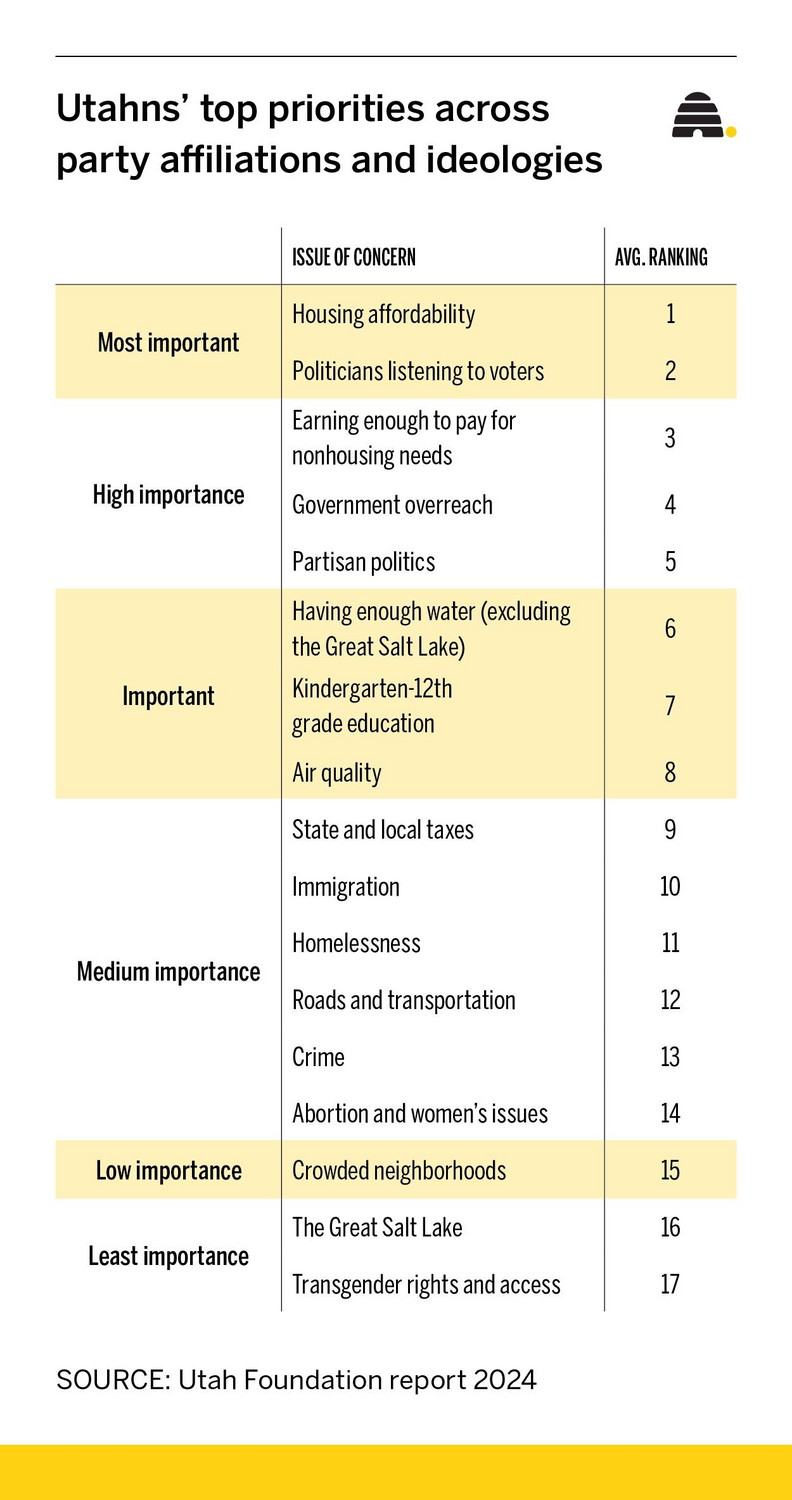Estimated read time: 3-4 minutes
SALT LAKE CITY — In its latest report, released Thursday, the Utah Foundation asked Utahns what they believed were the state's most significant issues. Housing, adolescent education and water usage turned out to be predominantly bipartisan issues, whereas matters regarding women's issues and transgender rights were more skewed. However, all were listed in the top 17 priorities of Utahns.
To identify these concerns, the Utah Foundation conducted two surveys, according to Utah Foundation President Shawn Teigen. The initial survey, conducted in January, featured two open-ended questions asking Utah voters to identify the two most important state or local issues they believe the next Utah governor should prioritize. Based on the responses, they compiled a list of the 17 most frequently mentioned issues out of more than 50 topics.
Top five most important issues:
- Housing affordability.
- Politicians listening to voter concerns.
- Dealing with inflation.
- Government overreach.
- Partisan politics.
Other issues on Utahns' priority list included problems facing the Great Salt Lake and crowded neighborhoods.
Utah's 2024 political landscape includes 53% of Utah voters who identify as Republicans and 14% who identify as Democrats — 27% were unaffiliated, and 6% registered under a third party.
"These are the issues that we wanted to highlight as part of this project, in order for voters to know that they kind of align with people across the political spectrum, but also so that legislators and other policymakers know this," Teigen said in a virtual roundtable meeting to discuss the Utah Priorities Project on Wednesday.
Being a predominantly red state, one result of the foundation's report is that the average Utah voter tends to fall more liberal on both sides of the political spectrum than their national counterpart, but more so for Democrat voters.
"Utah's ideological consistency among political parties looks substantially different once one accounts for the fact that Democrats make up 21% of Utah's registered voters while unaffiliated voters make up 43%," the report found. "That means although 72% of Democrats are consistently liberal, they are numerically equivalent to the 38% of Republicans that are either mostly or consistently conservative."

Housing is Utahn's top priority
"Whether you're very conservative or very liberal, you feel pretty similarly about water and housing," Teigen said.
As the fastest-growing state in the U.S., it may come as no surprise that housing is the top issue facing its residents.
"As we know, the governor's put that as a top priority in his $35,000 affordable home initiative," said Ginger Chinn, vice president of public policy and government affairs at the Salt Lake Chamber, during Wednesday's roundtable. "He recently appointed former Rep. Steve Waldrip to, you know, oversee housing initiatives across the state, and he's trying to come up with some solutions for housing affordability."
Teigen told the Deseret News that many Utahns, in their open-ended responses, mentioned frustration in the influx of new residents as being a cause of exasperating the housing shortage.
Historically, the increase in population was "from us having babies, and what we have seen is a little bit of a shift where we're having fewer kids. But we're also seeing a lot of people coming in, in part, because we have a robust economy," Teigen said, emphasizing that there is no one thing you can point to to blame for the increase in housing costs.
In 2024, Utah was ranked the top-performing state in the U.S. for the third year in a row, and U.S. News & World Report also ranked it the country's No. 1 economy.
"At the end of the day, we do have a great economy and we do have a great quality of life in the state, and it's beautiful, and there are a lot of amenities," Teigen added. "Those types of things are going to naturally put up an increasing pressure on home costs."









